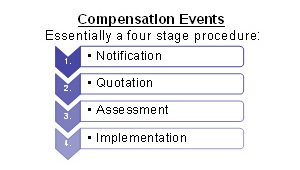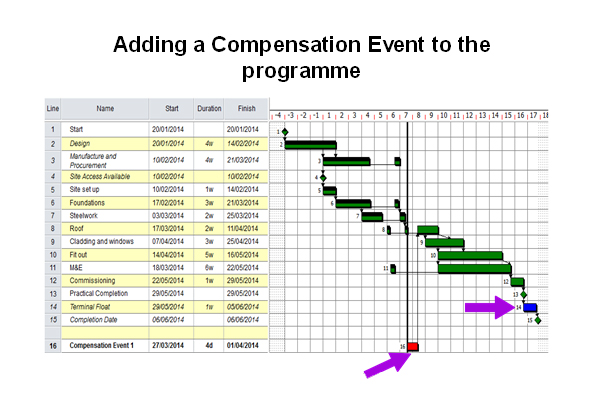Introduction
-
Everyone will have seen that the use of NEC Contracts has escalated over recent years. Perhaps the two most significant catalysts for its increase in use have been the praise given to the NEC Contracts in the Latham Report in 1994, and then more recently the recommendation given by the OGC in 2009.
-
In the early years of its use there was an ignorance of the procedures and many in the industry carried on managing projects and Compensation Events in the way that they had managed traditional contracts, such as the ICE and JCT Suites of Contracts. While some within the industry still adopt such procedures and practices when managing NEC projects, over the last five years or so the bar has been raised and there is now a high risk that those who ignore NEC procedures will lose or significantly diminish their entitlement under the Contract.

-
The purpose of this paper is to give some practical advice, for the most part relating to NEC3 since its inception in 2005. In that time Ramskill Martin has been involved with NEC Contracts or Subcontracts, ranging in value from £200k to £1.2billion. We have worked on both sides of the fence and I have acted as Adjudicator and Expert Witness on NEC disputes. It is against this background that this paper has been prepared.
Point 1 – NEC is not a Traditional Contract
-
We are often asked to provide comparisons between traditional (JCT and ICE 6th or 7th Edition Contracts) with the NEC Suite of Contracts. While we do the best we can to help with this translation, the best starting point is a blank sheet of paper (well almost), and we often find that it is easier to train someone who has no experience of these traditional contracts than people who have the more traditional approach and practices running through their veins. A change of mindset is essential, although not easy when the other party, perhaps the Project Manager or Main Contractor (depending on where you are in the contractual chain), does not play to the rules.
Point 2 – Back to Basics
-
The Compensation Event mechanism is a four-stage process involving:

-
As a starter when considering Compensation Events, have in your mind this four-stage process and try to ensure that these boxes are ticked.
Point 3 – Resources
-
Do not underestimate the resources required to effectively manage Compensation Event procedures. They require significantly more time than with traditional contracts. There is no Final Account procedure and if proper time is not spent during the course of the Contract, then there is a high chance that this will affect recovery. I know that this is easier said than done, but there is only limited scope for workaround or shortcuts in NEC Contracts.
-
It is often possible to draw together the effects of some relatively minor Compensation Events which affect the same or similar activities in a given month, and indeed this procedure is recommended in NEC guidance. Having said that, a general health warning with the NEC guidance – it specifically says that these are not to be used in the interpretation of the Contract and I have seen an Adjudicator’s Decision where a Contractor has followed guidance published by the NEC but the Adjudicator did not take that into account when arriving at his Decision. The Contractor, having followed such guidance, then found himself losing out in the Adjudication.
Point 4 – Notices, Notices, Notices
-
There are requirements on both parties (but particularly on the Contractor or Subcontractor) to notify any issues which increase the cost of or delay Completion of the Contract by way of Early Warning Notices and Compensation Event Notification. These procedures should not just be seen as contractual claim procedures.
-
NEC Contracts allow any party to notify a problem through the Early Warning mechanisms and then convene a Risk Reduction Meeting. A Risk Register should be prepared, showing any matters that can have an impact on the Contract, but in particular Compensation Events. It must be remembered, however, that the Risk Register does not in itself allocate risk to either party – this is often misunderstood.
-
It is often the instinctive norm of many to avoid claims-type correspondence if at all possible, preferring to meet face-to-face to iron out any problems or potential difficulties in a pragmatic way. It is always good to talk, but this should run alongside the issuing of relevant Notices and conforming to NEC procedures.
-
If you are unsure about the procedures in an NEC Contract, then it is best to err on the side of caution. There is little law to help with the interpretation of the day-to-day procedures in managing Compensation Events and we have seen Adjudicators come to opposite decisions on the same points. If you fail to give the relevant Notices, then it may be fatal to a claim for compensation. While not an NEC-based authority, the case of Education 4 Ayrshire v South Ayrshire Council (2009) gives some guidance on this issue.
-
We would recommend that a Notice of a Compensation Event is given, even if you might consider that it is not necessary. An example might be where an instruction that should, in the Contractor’s opinion, have been given, it was not.
-
There is some guidance on this in the case of Northern Ireland Housing Executive (NIHE) v Healthy Buildings (Ireland) Limited (HB(I)L) (2014). This involved the Professional Services Contract (PSC), but the wording relating to Notification of Compensation Events is similar to that in the Main Form. In this case the NIHE should have given Notice of a Compensation Event but did not. NIHE said that HB(I)L’s claim was time barred because Notice was not given within the eight-week period. The Consultant’s claim for a change in the price was held not to be time barred. This is not a surprising decision and falls into line with what most believe the NEC Contract says. That said, even on what for most did appear a straightforward point, it did end up in the Northern Ireland Court of Appeal.
Point 5 – Compensation Events are for Time and Money
-
Ensure that you include in any assessment of a Compensation Event, the effects on time and the financial consequences of the effects of time (perhaps extended preliminary costs, for example). Do not forget that if you are a Main Contractor you must also include costs incurred by Subcontractors. On a more general point, as a Main Contractor do not forget that all the procedures apply to your Subcontractors.
Point 6 – Agreement of Compensation Events
-
If you do not have the benefit of a purpose-made system for managing an NEC Contract, then prepare a spreadsheet, or something similar, from the outset, indicating all the key actions when such things as Notifications and Quotations were submitted, when Responses should be received and when such things as Deemed Acceptance might apply. Hold at least monthly meetings to review the status of Compensation Events.
Point 7 – Programme
-
Much has been said about the importance of the Programme. It is often referred to as the ‘beating heart’ of NEC Contracts. Do not underestimate the planning resource that will be required to successfully manage Compensation Events in an NEC Contract. Do not forget that progress is measured against planned completion. Compensation Events, however, impact on the Completion Date, which is important if damages are to be avoided. Do your best to ensure that there is an up-to-date agreed and accepted Programme. Provide narratives with the Programme so that what you submit is readily understandable.

-
Sheffield
The Annexe,
260 Ecclesall Road South,
Ecclesall,
Sheffield,
S11 9PSTel - 0114 230 1329
-
London
Adam House,
7-10 Adam Street,
London,
WC2N 6AATel – 020 7520 9295
-
Leeds
Suite 69,
4100 Park Approach,
Thorpe Park,
Leeds,
LS15 8GBTel - 0113 397 0358
-
Warrington
Suite 41,
Lakeview 600,
Lakeside Drive,
Centre Park Square,
Warrington,
WA1 1RWTel - 01925 984705
-
Manchester
3 Hardman Street,
Manchester,
M3 3HFTel - 0114 230 1329
-
Birmingham
Birmingham Business Park,
4200 Waterside Centre,
Solihull Parkway,
Birmingham,
B37 7YNTel - 0121 481 2381
-
Liverpool
Horton House,
Exchange Flags,
Liverpool,
L2 3PFTel - 07753 837149
